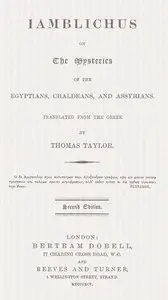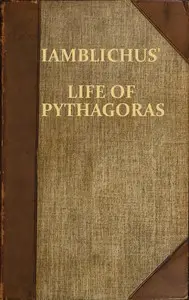"Iamblichus on the Mysteries of the Egyptians, Chaldeans, and Assyrians" is a philosophical treatise likely written in the late 3rd to early 4th century AD. The work explores ancient religious and philosophical traditions, focusing on the theological insights derived from Egyptian, Chaldean, and Assyrian mysteries. Iamblichus, a prominent Neoplatonist philosopher, delves into the nature of the divine, theurgy, and the relationship between humanity and the gods, presenting complex arguments designed to defend ancient beliefs against modern critiques. The opening portion of the text introduces Iamblichus's conversation with Porphyry, a fellow philosopher who has posed a series of theological inquiries to an Egyptian priest. In response, Iamblichus emphasizes the unbreakable connection between humanity and the divine, asserting that knowledge of the gods is innate and transcends ordinary understanding. He articulates the unique principles and characteristics that distinguish various divine and spiritual entities, advocating for a thorough examination of ancient theological doctrines. This section sets the stage for a comprehensive exploration of the mysteries that shape human understanding of the divine and offers a critique of the misconceptions surrounding ancient religious practices. (This is an automatically generated summary.)

Iamblichus on the mysteries of the Egyptians, Chaldeans, and Assyrians
By Iamblichus
"Iamblichus on the Mysteries of the Egyptians, Chaldeans, and Assyrians" is a philosophical treatise likely written in the late 3rd to early 4th centu...
Genres
Released
2024-01-29
Formats
epub3 (images)
epub
epub (images)
mobi (images)
Free Download
Overview
About the Author
Iamblichus was a Syrian neoplatonic philosopher. He determined a direction later taken by neoplatonism. Iamblichus was also the biographer of the Greek mystic, philosopher, and mathematician Pythagoras. In addition to his philosophical contributions, his Protrepticus is important for the study of the sophists because it preserved about ten pages of an otherwise unknown sophist known as the Anonymus Iamblichi.
Total Reviews
10.0k
Total reviews from Goodreads may change














